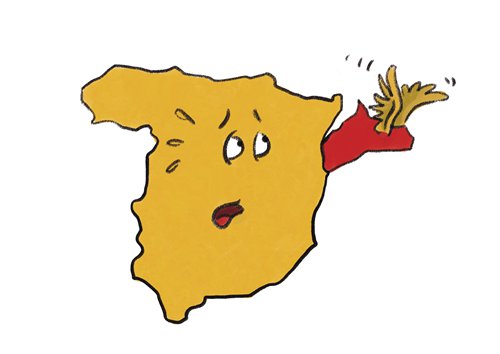
Illustration: Liu Rui/GT
On September 11, Catalan people celebrated the "Diada" (their regional day) in keeping with tradition. According to authorities, one million people came together to rally for a Catalonia separate from Spain. Even though it all started a year ago and so much has happened in Spain since then, the government's nightmare with the situation in Catalonia continues. A solution to the political puzzle is not in sight.
In 2017, the "Diada" triggered the separatist referendum on October 1. Although Madrid tried to stop it by declaring it illegal and sending police into Catalonia, social mobilization reinforced by support from regional institutions made it possible to hold the referendum. Ballot boxes were hidden in homes and young people helped elders to take to the streets. Seeing how people were moved by this political issue, the government should have realized that they were facing a grave problem which if mishandled could lead to serious social implications. Nonetheless, a year later the fracture has widened.
On October 27, 2017, Catalonia became the shortest republic in history. It only lasted a few seconds. Madrid took control over the region with an ultimatum: normality would only be restored after proper elections and a new regional government was formed. In the end, Quim Torra was elected president of Catalonia. Supporters and opposers of independence consider his election an attempt by the former Catalan to continue to exert influence over the region from self-imposed exile.
The Catalan crisis had taken its toll on former Spanish prime minister Mariano Rajoy, as the right candidate for dealing with the Spanish issue. His use of violence on civilians triggered international and domestic criticism. The loss of popularity of the prime minister's right-wing party gave an advantage to its liberal rival, which many polls put in the lead. The liberal party asked Madrid to continue with its direct rule over Catalonia, an attempt to portray Rajoy as too soft on the separatists. At last, the lack of support and open dissent forced Rajoy out of the prime minister's office in June as he lost a confidence vote in parliament.
Now Spain has a socialist government, which has a totally different approach to Catalonia. Prime Minister Pedro Sánchez, or Mr. Handsome as he is internationally known, is openly willing to engage in a process of dialogue with the Catalan administration. Sánchez has just sent a proposal to the Lower House for Catalonia to hold a referendum again but with two significant differences - legitimacy and the subject. The referendum would have sought self-governance rather than independence. Sadly, the proposal didn't get enough support. Only his party, the Catalan socialists and Podemos (left-wing party) backed it. It would have been the starting point for future negotiations but it failed because both Spanish nationalistic right-wing and Catalan left-wing parties looked at the proposal as too much and too little.
The political disagreement is actually a reflection of a scary social rupture. Half of the Catalan society truly believes in the separatist project while the other half likes the status quo. The clashes with the state and among Catalans may worsen in the coming weeks.
Nowadays the real problem is to re-establish peaceful coexistence rather than independence. But both are linked and inseparable. Also, Catalan separatism and Spanish nationalism are movements strongly attached to people's emotions so that any claim leads to a conflagration.
Torra's words will definitely not help heal social wounds. Also, the Catalan Cabinet has publicly declared that it will be a hot political autumn. They will keep using a few tricks from the past to bash the Spanish government and rally support for independence.
However, politicians should realize that the demand for Catalonia's independence is a social movement that lacks political leadership and concurrence of views. Not only does the Spanish government not have the answer, but also the Catalan administration doesn't know how to get out of this imbroglio. This matter can only be solved by resorting to a political approach and exercising imagination. Let's hope Sánchez is as resolute as handsome!
The author is a foreign policy analyst based in Europe. opinion@globaltimes.com.cn
